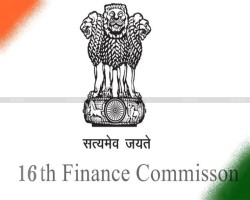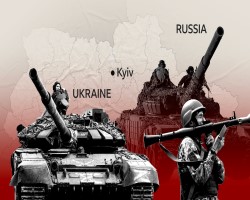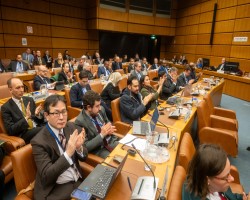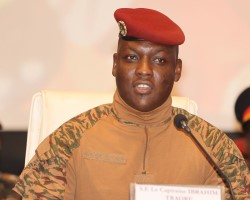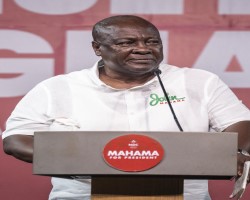UPSC Current Affairs
TABLE OF CONTENTS |
| Polity and Governance |
|---|
|
|
|
Why in the news?
The 16th Finance Commission arrived in Kerala on a three-day visit as part of preparing its recommendations. The Finance Commission is a constitutional body that recommends how tax revenues collected by the Central government should be distributed among the Centre and various States in the country. The Commission’s recommendations are aimed at fostering fiscal federalism and ensuring that state governments have the necessary funds to implement development projects. About Finance Commission: The Finance Commission, established under Article 280 of the Constitution of India, is to be constituted every fifth year or earlier, as per clause (1) of that article. It is a constitutional and quasi-judicial body. Accordingly, the first Finance Commission was constituted in 1951. The President of India appoints a finance commission every five years or at an earlier time that he considers necessary. Its primary role is to review the financial position of the states and recommend measures to enhance the fiscal capacity of both the central and state governments. The Commission plays a crucial role in ensuring the equitable distribution of financial resources between the centre and the states, thereby promoting balanced economic growth across the country. Finance Commission Composition: The Finance Commission consists of a Chairman and four other members appointed by the President of India. They serve for a term specified by the President and are eligible for reappointment. The Constitution empowers Parliament to set the qualifications for the Commission's members and outline the selection process. Following this constitutional provision, Parliament has defined the qualifications required for both the Chairman and the members. The Chairman must possess experience in public affairs, while the four other members are to be chosen from the following categories: A judge of a High Court or an individual qualified for such an appointment. A person with specialized knowledge in finance and government accounting. An individual with extensive experience in financial matters and administration. A person who has specialized knowledge in economics. Finance Commission Functions: The Finance Commission is tasked with making recommendations to the President of India on several crucial financial matters. The President then presents such reports to both Houses of Parliament, accompanied by an explanatory memorandum detailing the actions taken on its recommendations. However, the Centre is not legally bound to implement the suggestions made by the Finance Commission. The key areas for which the Finance Commission provides recommendations include: Vertical Devolution: The share of states in the divisible pool of central taxes. Horizontal Distribution: The allocation of resources among states based on a formula that reflects their fiscal needs, capacities and performance. Grants-in-aid: The additional transfers to specific states or sectors that are in need of assistance or reform. Among the grants made by the 13th FC, two important ones were justice delivery and the statistical system. The Department of Justice identified several initiatives that needed support, including increasing the number of courts working hours, enhancing support to Lok Adalat, providing additional funding to State Legal Services Authorities, promoting the Alternate Dispute Resolution mechanism, enhancing the capacity of judicial officers and public prosecutors through training programmes, and supporting the creation of a judicial academy in every state to facilitate such training. 16th Finance Commission: The Sixteenth Finance Commission was constituted on 31.12.2023 with Shri Arvind Panagariya, former Vice-Chairman, NITI Aayog as its Chairman. Now the following members are appointed to the Commission with the approval of the President of India. Members: Ajay Narayan Jha, Member Annie George Mathew, Member Manoj panda, Member Soumya Kanti Ghosh, Part-Time Member Ritvik Ranjanam Pandey, Secretary The Sixteenth Finance Commission has been requested to make its recommendations available by October, 31, 2025, covering an award period of 5 years commencing 1st April, 2026. 15th Finance Commission: The Finance Commission (FC) is a constitutional body, that determines the method and formula for distributing the tax proceeds between the Centre and states, and among the states as per the constitutional arrangement and present requirements. Under Article 280 of the Constitution, the President of India is required to constitute a Finance Commission at an interval of five years or earlier. The 15th Finance Commission was constituted by the President of India in November 2017, under the chairmanship of NK Singh. Its recommendations will cover a period of five years from the year 2021-22 to 2025-26. |
|
|
|
Previous Years Questions:
Q) With reference to the Fourteenth Finance Commission, which of the following statements is/ are correct? (UPSC Prelims 2015) 1. It has increased the share of States in the central divisible pool from 32 percent to 42 percent. 2. It has made recommendations concerning sector-specific grants. Select the correct answer using the code given below. (a) 1 only (b) 2 only (c) Both 1 and 2 (d) Neither 1 nor 2 Ans: (a) |
|
|
|
Frequently Asked Questions (FAQs):
Q1. What is the term of the 16th Finance Commission? Ans: The 16th Finance Commission's term will be 5 years, commencing 1st April 2026. Q2. What is the tenure of the Finance Commission? Ans: The Finance Commission is constituted every five years, or earlier if necessary. Q3. Who is the Chairman of the 16th Finance Commission? Ans: The Chairman of the 16th Finance Commission is Arvind Panagariya. Q4. What is Article 280 of the Constitution of India? Ans: Article 280 provides for the establishment of the Finance Commission by the President to recommend financial relations between the Centre and the states. Q5. Who was the first finance commissioner of India? Ans: The first Chairman of the Finance Commission was K.C. Neogy, appointed in 1951. |
| International Relations |
|
|
|
Why in the news?
Donald Trump on December 9th 2024 pushed Russian leader Vladimir Putin to act to reach an immediate cease-fire with Ukraine, describing it as part of his active efforts as president-elect to end the war despite being weeks from taking office. Zelensky and Ukraine would like to make a deal," Trump wrote on social media, referring to Ukraine's president, Volodymyr Zelenskyy. What is the Background of Russia-Ukraine conflict? Ukraine and Russia share hundreds of years of cultural, linguistic and familial links. For many in Russia and in the ethnically Russian parts of Ukraine, the shared heritage of the countries is an emotional issue that has been exploited for electoral and military purposes. As part of the Soviet Union, Ukraine was the second-most powerful Soviet republic after Russia, and was crucial strategically, economically and culturally. Why Russia invaded Ukraine? Russia wanted a guarantee Ukraine can never join NATO Russia's main demand was a commitment from NATO to end its further expansion into former Soviet republics — especially Ukraine. Russia wants NATO arms out of Eastern Europe Russia wants NATO to stop deploying its weapons and forces in countries in Central and Eastern Europe that joined the alliance after 1997. Russia wants a ban on NATO missiles within striking distance Russia has nervously watched as NATO has demonstrated it can deepen its involvement in Ukraine — providing weapons and training. NATO missiles on Ukrainian soil might pose serious threat to Russia’s security. Russia wants autonomy for eastern Ukraine Russia says Ukraine must meet its obligations under 2015 agreements. The peace deal, known as the Minsk agreements, was signed to end the fighting between Ukraine's army and pro-Russian separatists in eastern Ukraine. The Minsk agreements also provided additional autonomy to the separatist Russian-speaking territories in the Donbas. Invasion of Crimea: Russia seized Crimea from Ukraine in what was the first time a European country annexed territory from another country since World War-2. The annexation of Crimea from Ukraine followed a Russian military intervention in Crimea that took place in the aftermath of the 2014 Ukrainian revolution and was part of wider unrest across southern and eastern Ukraine. The invasion and subsequent annexation of Crimea have given Russia a maritime upper hand in the region. Sea of Azov clash-Post Crimea’s annexation, Russia and Ukraine fought over the Sea of Azov. It is connected to the Black Sea by a narrow strait. Russia built a bridge over the Kerch strait and blocked Ukraine’s ships from passing through. Russian backed rebels: Russia has been criticised for its involvement in the Donetsk and Luhansk regions in eastern Ukraine, it acknowledged that the two regions of Donbass region as independent republics which aggravated the issue. Migration crisis- Belarus, Russian ally sent many migrants to the border of Poland (EU member), it caused issues for Poland and EU. Ukraine’s pro-West stand: Ukraine became independent from Russia after the collapse of Soviet Union, Russia described Ukraine as a puppet of West. Current Situation: Russia is seeking assurances from the US that Ukraine will not be inducted into NATO. However, the US is not prepared to give any such assurance. This has left the countries in a stand-off, with tens of thousands of Russian troops ready to invade Ukraine. Russia is keeping the tensions high at the Ukraine border in order to get sanctions relief and other concessions from the West. Any kind of military action by the US or EU against Russia would precipitate a major crisis for the whole world, and has so far not been mooted by any of the parties involved. India’s Stand: India did not join the Western powers’ condemnation of Russia’s intervention in Crimea and kept a low profile on the issue. In November 2020, India voted against a Ukraine-sponsored resolution in the United Nations (UN) that condemned alleged human rights violations in Crimea thereby backing old ally Russia on the issue. |
|
|
|
Useful information for all competitive exams:
North Atlantic Treaty Organization (NATO) The North Atlantic Treaty Organization (NATO), also called the North Atlantic Alliance, is an intergovernmental military alliance of 32 member states—30 European and 2 North American. Established in the aftermath of World War II, the organization implements the North Atlantic Treaty, signed in Washington, D.C., on 4 April 1949. Formation: 4 April 1949 (75 years ago) Type: Military alliance Headquarters: Brussels, Belgium Membership: 32 Countries ( Albania, Belgium, Bulgaria, Canada, Croatia, Czech Republic, Denmark, Estonia, Finland, France, Germany, Greece, Hungary, Iceland, Italy, Latvia, Lithuania, Luxembourg, Montenegro, Netherlands, North Macedonia, Norway, Poland, Portugal, Romania, Slovakia, Slovenia, Spain, Sweden, Turkey, United Kingdom, United States) Secretary General(14th): Mark Rutte (Dutch) Chair of the NATO Military Committee: Rob Bauer |
|
|
|
Why in the news?
The Indian Embassy in Austria said in a statement that India has been chosen to Chair the 68th Session of the Commission on Narcotic Drugs (CND). Key Takeaways: Ambassador Shambhu S Kumaran, India's Permanent Representative to the United Nations in Vienna, officially assumed the Chairmanship of the prestigious UN forum. The CND is the principal policy-making body of the United Nations on drug-related matters. It is mandated to monitor global drug trends, support Member States in formulating balanced policies, and oversee the implementation of the major international drug conventions. The CND is one of the functional commissions of the United Nations Economic and Social Council (ECOSOC) and a Governing Body of the United Nations Office on Drugs and Crime (UNODC) which is headquartered in Vienna. This is the first time that India has been named to Chair this important UN body. This reinforces India's growing leadership role on the global stage and its commitment to addressing international issues through established multilateral mechanisms, as per the statement. As Chair, India will be expected to articulate the interests of the Global South in line with its role in promoting the interests and perspectives of developing nations in global discussions. India would also strive to build on the ongoing work of the CND to foster dialogue and understanding on drug policy issues and especially to integrate concerns of emerging economies with the priorities of developed nations to promote holistic and balanced approaches to this key issue. Over the coming year, the CND's agenda is expected to focus on strengthening international collaboration to address critical issues such as illicit drug trafficking, substance abuse, and their associated social and health impacts as well as availability of internationally controlled substances for medical and scientific purposes. By prioritizing multilateral dialogue and evidence-based solutions, India will continue to partner with other member states of the CND to advance equitable, inclusive, and sustainable strategies on all these issues. |
|
|
|
IN SHORT:
India has been chosen to Chair the 68th Session of the Commission on Narcotic Drugs (CND). Ambassador Shambhu S Kumaran, India's Permanent Representative to the United Nations in Vienna, officially assumed the Chairmanship of the prestigious UN forum. The CND is the principal policy-making body of the United Nations on drug-related matters. |
|
|
|
Useful information for all competitive exams:
United Nations Office on Drugs and Crime (UNODC): Established: 1997 Headquarters: Vienna, Austria Head: Ghada Waly (Egypt) (since 2020) Parent organization: United Nations Secretariat |
| Persons in News |
|
|
|
Why in the news?
Burkina Faso’s ruling military junta appointed a new Prime Minister, a day after dissolving the government without providing any reason. Key Takeaways: 📍Rimtalba Jean Emmanuel Ouedraogo, until now Communications Minister and spokesperson of the government, will be the West African country's new Prime Minister. History of Military Rule: 📍The junta in Burkina Faso seized power in September 2022 by ousting the military rule of Lt. Col. Paul Henri Sandaogo Damiba about eight months after it staged a coup to remove democratically elected President Roch Marc Kaboré. 📍The country is one of several West African nations where the military has recently taken over, capitalizing on popular discontent with previous democratically elected governments over security issues. 📍However, since its inception, the junta has struggled to end Burkina Faso’s security challenges — the very reason that it claimed had prompted it to take power. Security Challenges: Growing attacks by extremists linked to al-Qaida and the Islamic State group have devastated Burkina Faso, where thousands have been killed in recent years and more than 2 million people have been displaced, half of them children. Around half of Burkina Faso’s territory remains outside of government control, analysts say. Transitional government: 📍The country’s transitional government has been running under a constitution approved by a national assembly that included army officers, civil society groups and traditional and religious leaders. 📍Under pressure from West Africa’s regional bloc, ECOWAS, the junta had set a goal to conduct an election in July 2024 to return the country to democratic rule. However, in May it extended its transition term for five more years, the duration of one presidential term. |
|
|
|
Useful information for all competitive exams:
Economic Community of West African States(ECOWAS): The Economic Community of West African States is a regional political and economic union of fifteen countries of West Africa. Headquarters: Abuja, Nigeria Chairman: Bola Ahmed Tinubu President of the Commission: Omar Touray Establishment: 28 May 1975 (Treaty of Lagos) Member Countries: 15 members ( Benin, Burkina Faso (suspended), Cape Verde, Gambia, Ghana, Guinea (suspended), Guinea-Bissau, Ivory Coast, Liberia, Mali (suspended), Niger (suspended), Nigeria, Senegal, Sierra Leone, Togo) |
|
|
|
Why in the news?
John Dramani Mahama, who is returning as Ghana's president eight years after losing power, achieved his political comeback on a promise to mend the West African country's economy. About Election: His main rival conceded defeat after partial results showed Mahama, 66, was on course to win presidential election and that his National Democratic Congress would win a parliamentary election held the same day. About John Dramani Mahama: 📍The eldest son of a wealthy rice trader turned politician, Mahama became Ghana's interim leader in 2012 after the sudden death of President John Atta Mills, under whom Mahama served as vice president. 📍Mahama defeated his main challenger, Akufo-Addo, in an election a few months later - the first in a series of votes that pitted the two against each other. 📍During his four-year term, Mahama invested heavily in infrastructure but drew criticism over prolonged power shortages, macroeconomic instability and allegations of political corruption although he was not personally tainted. 📍He was first elected to parliament in 1996 and served as communications minister from 1998 to 2001. Atta Mills appointed him vice president in 2009. 📍Mahama failed to secure a second term as president in 2016, when Akufo-Addo defeated him on the back of falling gold, oil and cocoa export prices. Akufo-Addo defeated Mahama again in 2020 on a promise to restore growth. Context and Issues in Ghana: The election was dominated by Ghana’s economic crisis, including, High inflation (peaking above 50%). A debt default that led to a $3 billion IMF bailout. Currency devaluation and rising cost of living. NPP’s campaign slogan, “Break the 8,” aimed at securing a third consecutive term, failed due to public dissatisfaction. |
|
|
|
IN SHORT:
Mahama became Ghana's interim leader in 2012 after the sudden death of President John Atta Mills, under whom Mahama served as vice president. John Dramani Mahama returning as Ghana president. |
|
|
|
Useful information for all competitive exams:
Ghana: Ghana, officially the Republic of Ghana, is a country in West Africa. Capital: Accra Government: Unitary presidential republic Current President: Nana Akufo-Addo President Elect: John Dramani Mahama Currency: Cedi (GHS) |
| Important Days |
|
|
|
Why in the news?
International Anti-Corruption Day 2024 observed on 9 December, aims to spread awareness about the corruption practices. Introduced by the United Nations, this day is focused on highlighting the need for collective action from governments and private sectors to eliminate corruption. Key Takeaways: The International Anti-Corruption Day is observed on 9th December every year. The United Nations General Assembly on 31st October, 2003, adopted the United Nations Convention against Corruption, and designated December 9 as International Anti-Corruption Day, in order to raise awareness about corruption and of the role of Convention in fighting and preventing it. The convention came into force in the year 2005, and since then the day is being observed annually. The theme for the year 2024 is, ‘Uniting with Youth Against Corruption: Shaping Tomorrow's Integrity.’ International Anti-Corruption Day 2024 Significance: International Anti-Corruption Day 2024 is a significant day which aims to bring transparency against the fight for corruption: Empower Youth: Acknowledges the role of youth required to build a corruption free future. Global Solidarity: interconnects nations to fight against the common issues of corruption and its malpractices. Legal Reforms: urges governments across all nations to adopt more stricter laws and policies to fight against corruption. Improves Governance Systems: Brings more transparency and holds the government accountable to tackle the issues related to corruption. International Anti-Corruption Day 2024 urges and motivates the youth to fight against corruption and promote accountability and transparency among the government and the citizens. What is Corruption: Corruption may be defined as the abuse of entrusted power for private gain. Corruption Perceptions Index: The Corruption Perceptions Index (CPI) is an annual report by Transparency International that ranks countries based on perceived levels of public sector corruption. It scores nations on a scale of 0 (highly corrupt) to 100 (very clean). Denmark, Finland, New Zealand, Norway, Singapore, and Sweden are perceived as the least corrupt nations in the world, ranking consistently high among international financial transparency, while the most apparently corrupt are Syria, South Sudan, and Venezuela (scoring 13), as well as Somalia (scoring 11). India’s Rank in Global Corruption Perception Index: India’s position in the 2023 Corruption Perceptions Index was 93 out of 180 countries. While this reflects moderate progress, robust anti-corruption reforms remain critical to improving governance and attracting foreign investments. Anti-Corruption Laws in India: Prevention of Corruption Act, 1988: Defines corruption and penalties for offenses committed by public servants and bribe givers. Bharatiya Nyaya Sanhita, 2023: Replaces the Indian Penal Code, 1860 and modernises various provisions and reforms related to corruption and bribery. Lokpal and Lokayuktas Act, 2013: Addresses the grievances related to corruption and ensures public accountability. WhistleBlowers Protection Act, 2014: promotes transparency by safeguarding the reporters who inform about corrupt practices. Legal Measures include: Prevention of Money Laundering Act, 2002 Benami Transactions Act, 1988 Black Money and Imposition of Tax 2015 |
|
|
|
Useful information for all competitive exams:
United Nations Office on Drugs and Crime (UNODC): Established: 1997 Headquarters: Vienna, Austria Head: Ghada Waly (Egypt) (since 2020) Parent organization: United Nations Secretariat |
|
|
|
Frequently Asked Questions (FAQs):
Q1. Who organizes International Anti-Corruption Day? Ans: The United Nations Office on Drugs and Crime (UNODC) organizes International Anti-Corruption Day. Q2. What is the theme of Anti-Corruption Day 2024? Ans: The theme for International Anti-Corruption Day 2024 is Uniting with Youth Against Corruption: Shaping Tomorrow's Integrity. Q3. Is India a member of the UN Convention against Corruption? Ans: Yes, India ratified the United Nations Convention against Corruption (UNCAC) on May 9, 2011. Q4. When did International Anti-Corruption Day observed every year? Ans: December 9 |
Current-Affairs Video : 9-Dec-24 |
|
|
|
<< 8-Dec-24
|
|
|
